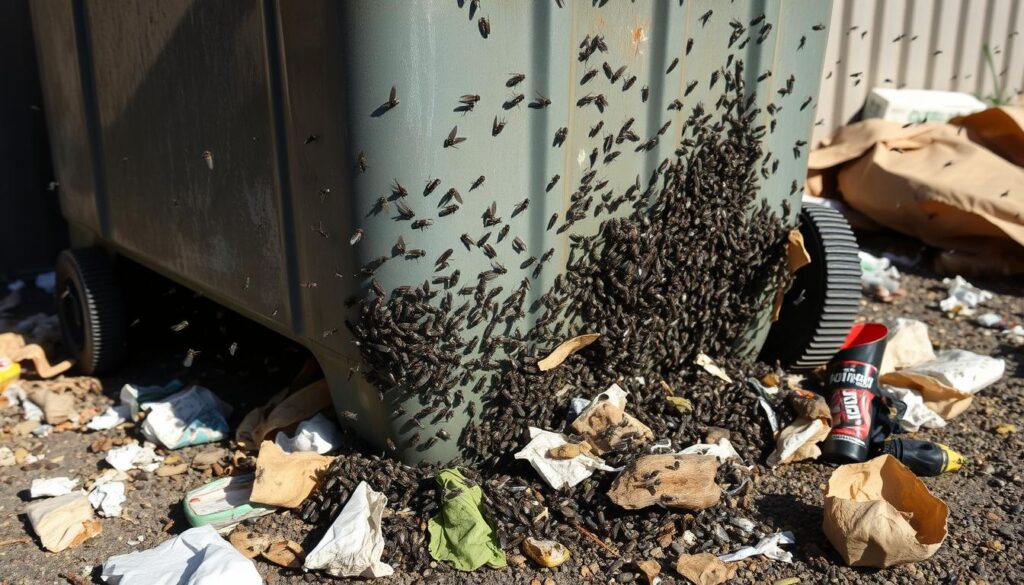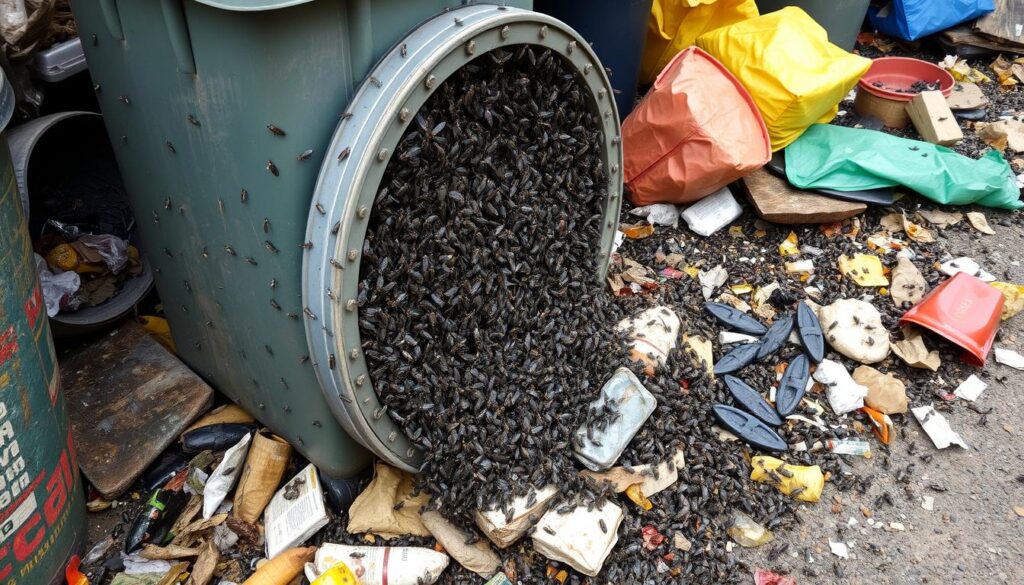Do you know that your wheelie bin might be a home for disease-carrying flies and their maggots? It’s important for everyone in the UK to know about these health risks. We must keep our places clean and free from flies.
Key Takeaways
- Female flies can lay around 1,000 eggs in their lifetime, leading to potential infestations in wheelie bins.
- Maggots can hatch within 24 hours and start feeding, spending about five days in the larval stage.
- Preventive measures such as keeping bin lids shut and double bagging food scraps can reduce the risk of maggots in wheelie bins.
- Cleaning and drying food packaging before recycling helps deter maggots.
- Businesses benefit from having separate bins for food waste to prevent maggot infestations.
The Unsavoury World of Wheelie Bin Fly Infestations
Wheelie bins attract flies with rotting food smells. Flies lay eggs quickly, and maggots hatch in 24 hours. These maggots grow into adult flies in five days, starting the cycle again.
What makes flies choose your bin? Warm weather, other flies, and dirty bins are big draws. Not cleaning your bin well can make it a health risk.
The Lifecycle of a Fly and Maggot Infestation
Flies can lay up to 150 eggs at once. These eggs turn into maggots in a day. Maggots eat waste for five days before turning into adult flies.
- Flies lay eggs in the bin
- Eggs hatch into maggots within 24 hours
- Maggots feed on waste for 5 days
- Maggots pupate and emerge as adult flies
- Adult flies continue the cycle by laying more eggs
Flies and maggots can grow fast. Keeping your bin clean is key to stopping infestations. This helps manage waste and keeps everyone healthy.
| Key Factors | Impact on Fly Infestations |
|---|---|
| Warm Temperatures | Speeds up fly life cycle and breeding |
| Presence of Other Flies | Brings more flies, making infestations worse |
| Lack of Cleanliness | Makes bins perfect for fly and maggot breeding |

“Neglecting to properly dispose of waste or failing to regularly clean your bin can quickly transform it into a public health risk.”
Wheelie Bin Fly Infestation: A Breeding Ground for Diseases
Wheelie bin fly infestations are not just a nuisance. They are a serious health risk. Flies and maggots can carry diseases that spread easily.
Common Illnesses Spread by Flies and Maggots
Flies and maggots in wheelie bin fly infestations can spread diseases. These include Salmonella, E. coli, and Shigella. They can also carry Leptospirosis, Rat-bite fever, and Hantavirus.
These diseases are a big risk to people. They can get sick from contaminated food and surfaces. Rodents in bins add to the health dangers.
- Flies can turn into maggots in just 8-16 hours in warm weather.
- Maggots mostly come from kitchen waste where eggs are laid.
- Stopping flies from breeding is key to controlling them.
Flies grow fast and spread disease. This makes it vital to prevent pests and keep waste clean. Businesses and homes must focus on hygiene and pest control.

Warm weather makes flies multiply quickly. Leaving bins open lets them lay eggs. Cleaning bins regularly stops organic matter buildup. This stops flies from laying eggs.
Maggots like warm, moist places. So, they infest bins more in summer.
The Repulsive Truth: Health Hazards of Maggot Infestations
Wheelie bin fly infestations are not just annoying. They also pose serious health risks. Maggots can cause many health problems.
Allergic Reactions and Skin Infections
Touching maggots can cause allergic reactions and skin irritations. The toxins they produce can lead to rashes and hives. Severe swelling can also happen.
These skin infections can get worse if not treated. They can cause more serious problems.
Myiasis: A Gruesome Infestation Within the Body
Myiasis is a serious health issue linked to maggots. It happens when larvae infest the body through wounds or other openings. This can be very painful and even life-threatening.
To keep everyone safe, we must manage waste well. We need to control maggots and keep areas clean. This stops flies from breeding and keeps our rubbish collection safe and clean.
“The presence of maggots in your wheelie bin is a clear sign of a more significant problem that requires urgent attention to safeguard your health and that of your community.”
Combating the Wheelie Bin Fly Infestation Menace
Keeping your wheelie bin clean is key to keeping everyone healthy. By using the right steps and safe ways to fight maggots, you can beat the fly problem.
Preventative Measures for a Fly-Free Environment
To keep flies away from your wheelie bin, try these tips:
- Always keep the lid closed to stop flies from getting in.
- Bag food waste tightly to cut down on smells that attract flies.
- Make sure recycling is clean and dry before putting it in the bin.
- Throw away food waste quickly to stop flies from coming.
- Use sprays or candles that keep flies away near the bin.
Safe and Effective Methods of Maggot Removal
If maggots show up, here are safe ways to get rid of them:
- Hot water or vinegar can kill maggots.
- Salt can stop maggots from living and growing.
- Freezing the bin is a safe way to kill maggots without chemicals.
Cleaning and disinfecting your bin often is vital. It keeps flies and maggots away. By following these steps, you can make your area cleaner and safer for everyone.
“Proper waste management and sanitation practices are the cornerstones of a healthy, pest-free community.”
Conclusion
Wheelie bin fly infestations are a big problem in the UK. They can spread diseases and cause allergic reactions. They can even live inside our bodies.
Businesses can keep their places clean and safe. They can do this by managing waste well and keeping bins clean. Using natural ways to keep flies away also helps.
Working with pest control experts is a good idea. They can help keep places safe and follow health rules.
It’s very important to deal with fly problems. This keeps everyone healthy and happy. By keeping places clean and watching out for pests, we can all stay safe.
